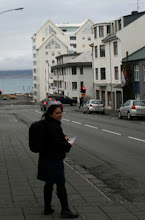
Many of them have university degrees, come from good families and generally lead an exemplary invisible life as migrants। Of course, they could have survived on what they earned back home. However, like most migrants, these cleaning ladies did not want to just survive. They wanted and still want a better life for themselves and their families.
How is that possible by working in Iceland? Simple। Only 60,000 Icelandic krónur (something between 27,000 to 30,000 pesos—USD 805, EUR 516) provides monthly sustenance for a family of five in the Philippines with two kids going through university.
Generally, the first migrants are women initially establishing a life for themselves, sending money home in the interim and because she wants better opportunities for her kids, sends for them and eventually sets up a home in the new country। Husband optional. Mainly because by the time she is ready for her family to come to Iceland, communication and intimacy with her significant other would have most likely broken down. It is also likely that she has met and been wooed by a lonely Icelandic widower or divorcee who in turn filled in her need for companionship and financial security in a strange country.
Many cleaning ladies have permanent jobs and cleaning homes is a moonlighting, tax-free opportunity। It does not pay much of course (between ISK 2,500 and 5,000; USD 33 and 67; EUR 22 and 43) an hour for back back-breaking work) but whatever little they get is additional moolah to send home or maybe even for this week's groceries.
On her spare time, she finds solace in the two Catholic churches in Reykjavík, bingo sessions or a spot of mahjong (that Chinese game played with tiles)। Every weekend there is a celebration, every birthday a riotous event with karaoke and variations of Filipino food (a few substitutions for key ingredients).
She does not go to museums, art being a non-entity in normal Filipino existence। Concerts are boring. Who wants to listen to instrumental renditions anyway? Well, unless you want to sleep. Coffee shops and bars are expensive, besides the cool ones never let in cleaning ladies on their days off anyway. It's a doorman thing. She does not ski, river raft or ice skate. Fun, outdoorsy stuff is not in her vocabulary.
Iceland as a new home can be trying. First, there is the language barrier. While Filipinos speak some form of English and many Icelanders do, it is still a challenge to find your way in the city. Traffic signs, notices and announcements are made in Icelandic. Our ears and tongues are not used to hearing Nordic languages. Every sound is new, every sentence unintelligible. Also, again because we come from a non-EEA nation, regardless of skill or expertise, Filipinos are required to learn Icelandic for a permanent work permit to be granted. This is a long and painful process.
Second, food is strange and new। Our palates are used to pork, tropical fruits, freshly picked veggies and the wide variety of seafood available in warm tropical shores. The taste of lamb takes a while to get used to (although once we do, it becomes a favorite), what Icelanders call lobster is actually langosteen and shrimp is unshelled. Many flavors are dulled by freezing.
Third, whatever people may say, Iceland is still a trying place for sociable people. Back home in the motherland, walls are thin, backyards are shared and babysitting duties are not considered favors but neighborly responsibilities. What Icelanders regard as privacy, most Asians see as social isolation.
Still, we persist। You see as little as 60,000 krónur is enough for a family of five to survive in a country where people demonstrate in streets over rising rice prices and schoolchildren stop attending classes because they have nothing to eat for lunch.
Iceland is a land of opportunitय. Yet, we are keenly aware that once the need for extra workers dwindles to nothingness in Iceland, it may be time to go home and leave this invisible existence.
http://www.icelandreview.com/icelandreview/daily_life/?cat_id=16539&ew_0_a_id=306270



